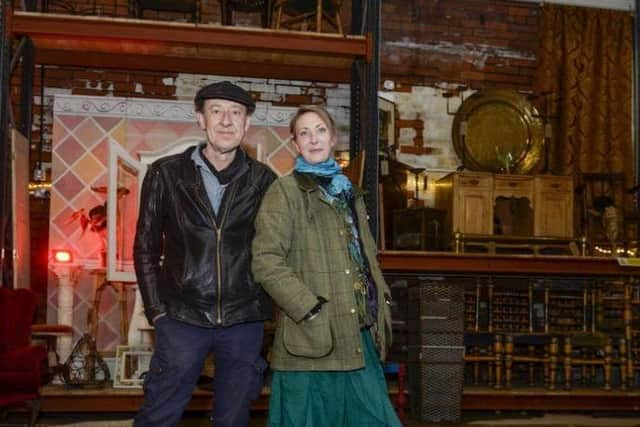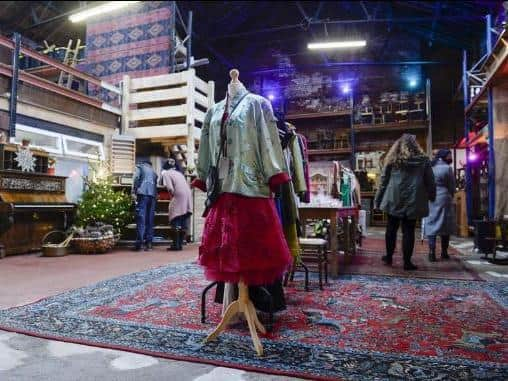New antiques centre opens to help Sheffield studio that launched Arctic Monkeys survive Covid
The mass cancellation of gigs this year has caused Yellow Arch Studios in Neepsend, Sheffield to lose a major income stream, as it operated a concert venue and bar as well as offering spaces for artists to rehearse and record.
But last weekend the studios’ director Andy opened The Warehouse, a large salvage and antiques centre selling items dating from the 17th century to the 1930s inside a cavernous 2,500 sq ft store.
Advertisement
Hide AdAdvertisement
Hide AdAndy has had a lifelong passion for antiques, and believes the business could be a way forward for Yellow Arch in a post-coronavirus world.


"We just had to reinvent Yellow Arch pretty quick,” he says. “I thought 'It's time to get off the music industry train and do something else’.”
Having spent plenty of time ‘snooping around salvage fairs and antiques shops’, Andy views The Warehouse as the logical ‘next stage’. Many of his finds have previously been displayed around the studios.
"I'm one of those people who's been searching, looking, enjoying, restoring, but never selling on.”
Advertisement
Hide AdAdvertisement
Hide AdYellow Arch started as a nuts and bolts factory for the bridge and shipping industries in the Edwardian era. After being rediscovered in the mid-1990s in disarray and ruin, the studios team set about redesigning and refurbishing the complex on Burton Street, which opened in its present guise in 1997.


Andy Cook inside the space that will become The Warehouse at Yellow Arch Studios. Picture: Andrew Roe.
Alex Turner and his Arctic Monkeys bandmates first showed up there in around 2003 – four aspiring teenage musicians from High Green being dropped off by their mums after school for their first proper practice sessions. They used rehearsal room three to hone the songs that would comprise their debut album, which immediately became the fastest-selling by a new band in UK chart history on its release in 2006.
Yellow Arch – also used to produce albums by Jarvis Cocker, Richard Hawley and Kylie Minogue – remains active as a recording studio ‘more than ever’, Andy says, but the rehearsal service has been cut back.
Advertisement
Hide AdAdvertisement
Hide Ad"We've converted the rehearsal rooms into recording studios. We're working with the BBC and various media organisations now because, unfortunately, until Covid is absolutely a thing of the past musicians need to get back on the stage quickly otherwise we're going to lose them.”
The aim is for the studios to be increasingly used for live-streaming events, explains Andy.
"We're embracing that. Two out of the four studios are ready and the other two will be ready by January. We've tripled the whole facility. We've got the resources and in the industry we completely feel this is where it's going.
"Where artists may have got £1,000 of ticket revenue, because of Covid they will only get £500 because of social distancing, and we're going to make the other £500 up because it will be streamed live.
Advertisement
Hide AdAdvertisement
Hide Ad"You won't be watching Netflix, you'll be going 'What are we watching live tonight?' There's something more magical about that than knowing it's been pre-recorded.”
He says the sight of The Leadmill and its like packed to the rafters with gig-goers will return – just not as soon as people might wish.
"If you read the science I'm going to say it'll be somewhere between one and four years, if there isn't another virus. I think the world will always now live with social distancing. If you're going to have a robust economy you've got to go with the worst case scenario and build from there. And that's what we're doing – this either happens in the next six months or we will lose Yellow Arch. So much revenue comes from the ticketed live shows and the bar sales.”
The rehearsal studios haven't stopped for good, but their ‘regular, 24/7’ operation has, Andy says.
Advertisement
Hide AdAdvertisement
Hide Ad"You'll probably go online and book. There won't be as much rehearsal studio time as there used to be. Five or 10 years ago most local artists would rehearse two or three times a week, now it's once a fortnight. Rehearsal rooms aren't getting that general footfall any more, people are in their bedrooms or garages or doing it online. We had to go with the times.”
The Warehouse will stock items that range in price ‘from £1 to £1,000’, accompanied by a selection of products from local makers such as Peak Soap and Beaumont Bags, plus prints from artists and photographers.
“I'm not going to be charging people for selling their things in the warehouse unless they sell them, so there's no pitch fees or money up front, because no-one's got any,” says Andy. “I thought I'd take the risk and then charge a little at the end and that seems to have made everyone get involved.”
The ambition, he says, is to ‘drag everybody out of Ikea’.
“You can buy a 120-year-old mirror that's four feet high for the same price as some plastic from China. Everybody seems to love rummaging through old stuff, it's great fun. The Kelham Flea emporium is very popular – it's completely eclectic and cross-demographic.”
Advertisement
Hide AdAdvertisement
Hide AdThe Warehouse will be open to the public on weekends only. "That's because I don't want it to run away with itself and be some leviathan where we have to have 20 staff. I want it to be fun, not a big business. The idea is that we're going to have local art exhibitions, antiques and salvage, music, a café and a bar, all family-oriented, between 10 and teatime on Saturdays and Sundays. You can bring the kids and the dog and have a snoop.”
Yellow Arch now has a ‘creative industries block’ too, where music therapy, sculpting and more happens. In October the overall site received £161,053 from the Government’s Culture Recovery Fund to help it stay afloat.
“We're trying to get the Sheffield community to see the building as Yellow Arch, not the things that go on inside,” says Andy. “If you say Hagglers Corner, an instant vision of that building appears in your head – that's what we're trying to do. We're trying to make everyone call the building Yellow Arch because inside will probably be a dozen individual businesses all beavering away within the creative arts, and it just so happens we've got a bar with a venue as part of it.”
All this diversification will allow Andy and his colleague, producer Colin Elliot, to ‘step back slightly’.
Advertisement
Hide AdAdvertisement
Hide Ad“Colin and I will always be here and overseeing it, but it won't be driven 100 per cent by us,” says Andy. “Having young blood around with ideas is fabulous, I must say.”
One proposition that has been shelved is the hope of opening a new arts venue for classical performance in the space now home to The Warehouse. Andy says the scheme, revealed in 2018, was difficult to get off the ground financially.
“Building a venue now from scratch... nobody wants to take the risk, it's really sad. I think we'll carry on having little pockets of spaces for live music, but I don't think we'll jump to the bigger capacity, unfortunately.”
Support The Yorkshire Post and become a subscriber today. Your subscription will help us to continue to bring quality news to the people of Yorkshire. In return, you'll see fewer ads on site, get free access to our app and receive exclusive members-only offers. Click here to subscribe.
Comment Guidelines
National World encourages reader discussion on our stories. User feedback, insights and back-and-forth exchanges add a rich layer of context to reporting. Please review our Community Guidelines before commenting.